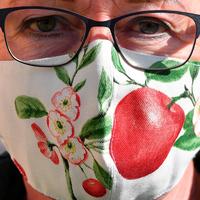Mundschutz: schwierige Kommunikation
mouth guard||
Mouthguard: difficult communication
Mascarilla: comunicación difícil
Kommunikation mit Mundschutz ist in China kein Problem.
Communication with face masks is not a problem in China.
Dort klappt die Verständigung auch mit Maske.
|||communication|||
There, communication also works with a mask.
La comunicación funciona allí incluso con una máscara.
マスクを使用しても通信はそこで機能します。
In Deutschland gibt es dagegen mehr Schwierigkeiten – und das liegt nicht an der deutschen Sprache.
||||against it||||||||||
In Germany, on the other hand, there are more difficulties - and it's not because of the German language.
En Alemania, por otro lado, hay más dificultades, y eso no se debe al idioma alemán.
しかし、ドイツではもっと困難があります-そしてそれはドイツ語のせいではありません。
Was gehört zu einem erfolgreichen Gespräch?
What goes into a successful conversation?
¿Qué es parte de una conversación exitosa?
成功した会話の一部は何ですか?
Ein offener Blick und ein freundliches Lächeln, sagen Karriereberater.
||glance||||||
An open look and a friendly smile, say career advisors.
Una mirada abierta y una sonrisa amistosa, dicen los asesores profesionales.
オープンな外観とフレンドリーな笑顔、キャリアアドバイザーは言います。
Doch mit dem Lächeln wird es schwierig, wenn man einen Mundschutz trägt.
But it becomes difficult to smile when you wear a face mask.
Pero la sonrisa se vuelve difícil cuando usas una mascarilla.
Das gilt besonders in Ländern wie Deutschland, wo die Menschen bei der Kommunikation stark auf den Mund ihres Gegenübers achten.
||||||||||||||||||opponent's|pay
This is especially true in countries like Germany, where people pay close attention to the mouth of the other person when communicating.
Esto es especialmente cierto en países como Alemania, donde las personas prestan mucha atención a la boca de sus homólogos cuando se comunican.
これは、人々がコミュニケーションをとるときに相手の口に細心の注意を払うドイツのような国で特に当てはまります。
Er zeigt ihnen, ob der andere freundlich lächelt oder nicht.
He shows them whether the other is smiling nicely or not.
Les muestra si el otro está sonriendo amistosamente o no.
彼は、相手がうまく笑っているかどうかを彼らに示します。
Die Augen spielen in westlichen Kulturen keine so große Rolle für die Verständigung, denn häufig vermeidet man den Blickkontakt zu Fremden.
|||||||||||||||avoids|||eye contact||strangers
In Western cultures, the eyes do not play such a big role in communication, because you often avoid eye contact with strangers.
En las culturas occidentales, los ojos no juegan un papel tan importante en la comunicación, porque a menudo se evita el contacto visual con extraños.
西洋の文化では、見知らぬ人との目との接触を避けることが多いため、目はコミュニケーションにおいてそれほど大きな役割を果たしません。
Aus diesem Grund bemerkt man das Lächeln einer Person nicht, wenn eine Maske ihren Mund bedeckt.
|||notices||||||||||||
For this reason, a person's smile will not be noticed when a mask covers their mouth.
Por esta razón, la sonrisa de una persona no se notará cuando una máscara le cubra la boca.
このため、マスクが口を覆っているときは、人の笑顔に気づかれません。
In anderen Ländern wie China dagegen achtet man bei der Kommunikation stärker auf die Augen.
In other countries like China, on the other hand, you pay more attention to your eyes when communicating.
En otros países como China, en cambio, prestas más atención a tus ojos cuando te comunicas.
Deshalb gelingt die Kommunikation mit Mundschutz dort leichter.
|succeeds||||||
That is why communication with a face mask is easier there.
Es por eso que la comunicación con una mascarilla es más fácil allí.
そのため、フェイスマスクとの通信が簡単になります。
Interviews mit Mitarbeiterinnen der Deutschen Welle zeigen, wie groß die Unterschiede zwischen verschiedenen Kulturen sind.
|||||wave|||||||||
Interviews with employees of Deutsche Welle show how big the differences are between different cultures.
Las entrevistas con empleados de Deutsche Welle muestran cuán grandes son las diferencias entre las diferentes culturas.
Deutsche Welleの従業員へのインタビューは、異なる文化間の違いがどれほど大きいかを示しています。
Kishwar Mustafa aus Pakistan zum Beispiel hat trotz Mundschutz keine Probleme mit der Verständigung: Sie ist daran gewöhnt, dass Frauen in der Öffentlichkeit wenig Mimik zeigen.
||||||||||||||||||||||||facial expressions|
Kishwar Mustafa from Pakistan, for example, has no problems communicating despite a face mask: She is used to women showing little facial expression in public.
Kishwar Mustafa de Pakistán, por ejemplo, no tiene problemas para comunicarse a pesar de una mascarilla: está acostumbrada a que las mujeres muestren pequeñas expresiones faciales en público.
たとえば、パキスタンのKishwar Mustafaは、フェイスマスクにもかかわらず、コミュニケーションに問題はありません。彼女は、人前で顔の表情がほとんどない女性に慣れています。
Viel schwieriger ist die Situation für die Argentinierin Veronica Herchenbach.
The situation is much more difficult for the Argentinean Veronica Herchenbach.
La situación es mucho más difícil para la argentina Veronica Herchenbach.
Sie erklärt: „In Südamerika ist die indirekte Kommunikation sehr ausgeprägt.
She explains: “In South America, indirect communication is very pronounced.
Ella explica: “En América del Sur, la comunicación indirecta es muy pronunciada.
Die Gestik, die Mimik, der Blick, all das sagt mehr als Worte.“
The gestures, the facial expressions, the look, all of this says more than words. "
Los gestos, las expresiones faciales, la mirada, todo esto dice más que palabras ".
ジェスチャー、顔の表情、見た目、これらすべてが言葉以上のものを語っています。」
In einem Punkt sind sich die beiden aber einig: Sie finden, dass die Menschen unfreundlicher geworden sind, seit es die Maskenpflicht gibt.
On one point, however, the two agree: They think that people have become more unfriendly since the mask requirement was introduced.
En un punto, sin embargo, los dos están de acuerdo: piensan que la gente se ha vuelto más antipática desde que se introdujo el requisito de la máscara.
しかし、両者は1つの点で同意しています。つまり、マスク要件が導入されて以来、人々はより不親切になっていると考えています。
Die neuen Regeln sorgen für Stress, und man wird häufiger zurechtgewiesen, wenn man sich nicht daran hält.
The new rules are stressful and more likely to be reprimanded for not following them.
Las nuevas reglas son estresantes y es más probable que sean reprendidas por no seguirlas.
新しい規則はストレスが多く、従わなかったために叱責される可能性が高くなります。
Vielleicht müssen die Menschen in Deutschland zwei Dinge lernen, damit die Atmosphäre wieder freundlicher wird: mit den Augen zu lächeln und sich öfter in die Augen zu schauen.
Maybe people in Germany have to learn two things to make the atmosphere friendlier again: to smile with your eyes and to look each other in the eye more often.
Quizás la gente en Alemania tenga que aprender dos cosas para volver a hacer el ambiente más amigable: sonreír con los ojos y mirarse a los ojos con más frecuencia.
おそらく、ドイツの人々は、雰囲気を再び親しみやすくするために、2つのことを学ぶ必要があります。それは、目で微笑むことと、目でお互いをより頻繁に見ることです。

